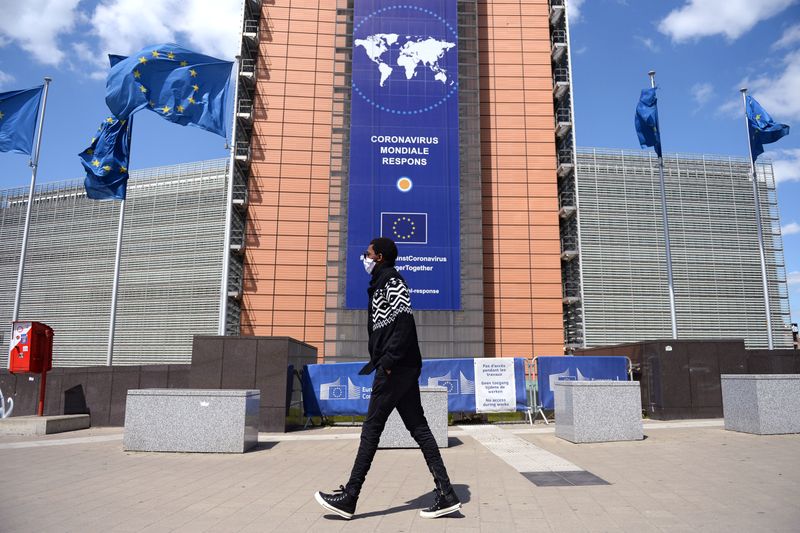By Jan Strupczewski
BRUSSELS (Reuters) - After a row over joint borrowing to respond to the new coronavirus pandemic, the European Union looks set to clash over whether governments should assign new tax revenues to the EU to help finance a recovery from the pandemic-induced recession.
Like the tussle over joint debt, the idea of the EU getting some or all of the revenues from any new taxes levied by its 27 governments goes to the heart of the debate over how much national sovereignty should be ceded to the bloc.
The European Commission is likely to ask this month for new sources of direct income, called "own resources", to be included in its next budget, following up on a proposal made in 2018 to boost revenue that currently comes from customs and sugar levies, a slice of national VAT and national contributions based on the size of each economy.
"The euro bonds or 'coronabonds' did not fly ... so many people - also in the European parliament - have switched to arguing for new 'own resources'. It is even better: It is direct income - better than borrowing," one senior EU official said.
The seven-year, trillion-euro EU budget finances EU policies aimed at equalising living standards across the 27-nation bloc as well as the EU's agriculture policy, investment in research, development and education, and the projection of the bloc's soft power around the globe through development and aid programmes.
In 2018, the Commission argued that the EU, which has not changed its budget financing system for 32 years, should also get a cut from corporate tax, from CO2 emissions trading, from a tax on non-recycled plastic, as well as money arising directly from EU policies.
The EU may also consider new sources of revenue such as a financial transactions tax, a digital tax or a levy on products imported to the EU that were produced under lower CO2 emissions standards than in the EU, the European Parliament said.
DESPITE PANDEMIC, IT WILL BE A TOUGH SELL
The bid for new money for the EU did not get enough support from governments in 2018 and it is far from certain to get it now even though the European Parliament has made new revenues a condition for approving the 2021-2027 budget, which it, the Commission and all EU governments decide on jointly.
The 2021-2027 budget must be agreed on by the end of this year to become operational next January.
Despite the enormity of the crisis the EU is facing, such a major step towards further integration may still be beyond the appetite of many EU countries - especially those in the frugal north of the bloc, who are by and large net contributors to the budget.
"I don't think that a kind of European tax will be possible," a senior euro zone official said.
"I only see the possibility of an increase of the contribution based on the size of the economy and this will already be very difficult."
Nevertheless, the coronavirus pandemic has changed the discussion as it looks likely to drive Europe into its deepest recession ever this year and as the economic potential for recovery varies across the bloc.
"It might take a crisis this deep for Europe to collectively arrive at this sensible conclusion," a second senior EU official said.
Some countries are entering the downturn with large debts and economies that were already struggling, while others have relatively little debt and are more economically nimble.
EU officials had already seen this divergence as a threat to the bloc's treasured single market of 450 million consumers before the pandemic spread. And the differences will only grow bigger during the recovery as some rebound quickly and others lag.
To even out the chances of restarting growth and to keep the single market intact, the EU needs money to distribute to those more in need of help. It is discussing setting up a Recovery Fund with money borrowed cheaply on the market by the European Commission.
But it may not help much if the fund only provides loans - albeit cheaply and with repayments spread out over many years - because some of the countries most in need such as Italy, Greece and Spain already have dangerously high public debt.
Therefore, the Commission will also propose issuing grants that could be paid for using the new "own resources" that governments would assign the EU.
"Allowing the EU to finance expenditure through borrowing and providing it limited rights of taxation would be a big step towards federative integration," a second senior euro zone official said. "I think that is the way we should move."

"It would be a huge, future-defining step in European integration, and that is something that should not and cannot be done by stealth by just re-interpreting the Treaties," the official said.